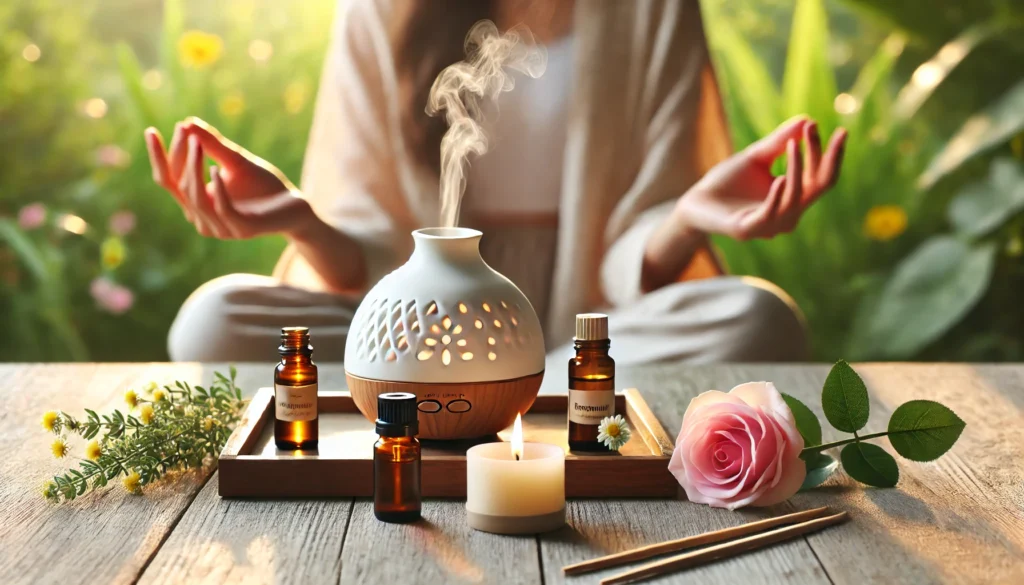In today’s fast-paced world, stress has become an almost ubiquitous part of our daily lives. As stress levels soar, so do our cortisol levels—a hormone that, when elevated for prolonged periods, can wreak havoc on our mental and physical health. Fortunately, nature offers us a remedy in the form of essential oils, celebrated for their calming properties and their ability to naturally reduce cortisol levels.
You may also like: Top 10 Herbs for Stress Relief
Understanding Cortisol and Its Impact
Cortisol, often referred to as the “stress hormone,” is produced by the adrenal glands and plays a crucial role in various bodily functions, including metabolism regulation, inflammation reduction, and the management of the body’s stress response. While essential in acute stress situations, chronic elevation of cortisol can lead to a host of health issues, such as anxiety, depression, weight gain, and even cardiovascular disease.
The Role of Cortisol in the Body
Cortisol is indispensable in managing the body’s fight-or-flight response. It helps to increase glucose availability, enhance the brain’s use of glucose, and curb non-essential functions during a crisis. However, when stress becomes chronic, the constant release of cortisol can lead to health problems. Understanding how cortisol operates in the body allows us to appreciate the importance of regulating its levels.
Effects of Prolonged Cortisol Elevation
Prolonged elevation of cortisol can have detrimental effects on both mental and physical health. It can contribute to conditions such as chronic fatigue, anxiety, depression, and even memory impairment. Physically, it can lead to weight gain, particularly around the abdomen, as well as an increased risk for hypertension and type 2 diabetes. This makes managing cortisol levels crucial for overall health.
The Natural Approach to Cortisol Reduction
Managing cortisol naturally involves lifestyle changes, including stress management techniques, a balanced diet, and regular exercise. Essential oils can complement these strategies by providing a natural, non-invasive method to help manage stress and lower cortisol levels. These oils are derived from plants and contain potent bioactive compounds that can have a profound effect on our mood and stress levels.

The Science Behind Essential Oils
The therapeutic potential of essential oils lies in their complex chemical composition. When inhaled or applied topically, the aromatic compounds in these oils interact with the limbic system of the brain, which is responsible for emotion and mood regulation. This interaction can lead to reduced stress and anxiety, thereby lowering cortisol levels.
Chemical Composition of Essential Oils
Essential oils are composed of a wide range of volatile compounds, including terpenes, esters, alcohols, and ketones. These compounds contribute to the unique scent and therapeutic properties of each oil. For instance, linalool and linalyl acetate, found in lavender oil, are known for their calming effects, while limonene in citrus oils is uplifting.
Interaction with the Limbic System
The limbic system is a complex system of nerves and networks in the brain that controls basic emotions and drives. When inhaled, essential oil molecules are believed to trigger the olfactory system, which is directly connected to the limbic system. This interaction can modulate emotional responses and lead to changes in mood, stress levels, and even physiological processes, such as heart rate and blood pressure.
Scientific Validation and Emerging Research
Recent scientific research supports the traditional use of essential oils for stress reduction. Studies have shown that certain oils can decrease cortisol levels, improve mood, and enhance cognitive function. This growing body of evidence has increased the acceptance of aromatherapy in mainstream wellness practices and has sparked further interest in the potential of essential oils as therapeutic agents.
Top Essential Oils for Lowering Cortisol
Here, we delve into some of the most effective essential oils known for their ability to reduce cortisol levels and promote a sense of calm.
1. Lavender Essential Oil
Lavender is perhaps the most well-known essential oil for stress relief. Its calming aroma is often used to treat anxiety, depression, and insomnia. Scientific studies have shown that inhaling lavender oil can significantly decrease cortisol levels and promote relaxation.
Benefits of Lavender Oil
Lavender oil is renowned for its ability to calm the mind and body. It can help alleviate symptoms of anxiety and depression, improve sleep quality, and enhance mood. Its soothing properties make it a popular choice for those looking to reduce stress naturally.
Usage Tips for Lavender Oil
Lavender oil can be used in various ways, such as in a diffuser, added to a bath, or applied topically with a carrier oil. For sleep support, a few drops on a pillow can promote restful slumber. Topical application to the temples and neck can relieve tension and provide quick stress relief.
Research and Studies on Lavender Oil
Numerous studies have explored the effects of lavender oil on stress and cortisol levels. One study found that participants who inhaled lavender oil experienced significant reductions in anxiety and cortisol levels. These findings support the traditional use of lavender oil for stress management and encourage further research into its benefits.
2. Bergamot Essential Oil
Bergamot oil, extracted from the peel of the bergamot orange, has a refreshing citrus scent that is both uplifting and calming. Research suggests that bergamot oil can reduce stress-induced cortisol secretion, making it an excellent choice for those looking to manage stress naturally.
Unique Properties of Bergamot Oil
Bergamot oil is unique for its dual action of being both uplifting and calming. It can improve mood, alleviate stress, and enhance relaxation. Its citrusy scent is invigorating, making it a popular choice for combating fatigue and boosting energy levels.
How to Use Bergamot Oil
Bergamot oil can be used in aromatherapy by adding a few drops to a diffuser or inhaling directly from the bottle. It can also be blended with other oils for a customized stress-relief blend. Topical application should always be diluted with a carrier oil to avoid skin irritation.
Supporting Studies on Bergamot Oil
Recent studies have highlighted the efficacy of bergamot oil in reducing anxiety and cortisol levels. In one study, participants who inhaled bergamot oil reported feeling more relaxed and energized, with significantly lower cortisol levels. These findings underscore the potential of bergamot oil as a natural stress reliever.
3. Rose Essential Oil
Renowned for its floral fragrance, rose oil is another powerful stress-reliever. Studies have indicated that rose essential oil can decrease cortisol levels and improve mood, making it a valuable addition to any stress-management regimen.
Emotional Benefits of Rose Oil
Rose oil is celebrated for its ability to uplift the spirit and calm the mind. Its aroma is associated with feelings of love and happiness, making it an effective tool for reducing emotional stress and promoting a sense of wellbeing.
Practical Uses for Rose Oil
Rose oil can be used in diffusers, added to bathwater, or applied topically with a carrier oil. Its gentle fragrance makes it ideal for creating a peaceful environment in a bedroom or meditation space. A few drops on a handkerchief can provide a quick mood lift during stressful times.
Research Insights on Rose Oil
Scientific research supports the use of rose oil for stress reduction. Studies have shown that inhaling rose oil can lead to decreased cortisol levels and improved mood. These findings validate its traditional use and highlight its potential as a natural remedy for stress management.
4. Frankincense Essential Oil
Frankincense, with its woody, earthy aroma, has been used for centuries in spiritual and medicinal practices. It is known for its ability to calm the mind and reduce stress. Inhaling frankincense oil has been shown to lower cortisol levels, thus promoting a state of relaxation.
Historical and Spiritual Significance
Frankincense has a rich history of use in religious and spiritual ceremonies. Its calming scent is believed to deepen meditation and enhance spiritual awareness. This historical significance adds to its appeal as a tool for stress reduction and mental clarity.
Methods of Using Frankincense Oil
Frankincense oil can be diffused to create a tranquil environment or applied topically for direct stress relief. It can also be blended with other oils for a synergistic effect. Its grounding aroma makes it an excellent choice for meditation and mindfulness practices.
Evidence-Based Benefits of Frankincense Oil
Research has demonstrated the calming effects of frankincense oil on the nervous system. Studies have found that it can reduce anxiety, promote relaxation, and lower cortisol levels. These findings support its traditional use and suggest potential for therapeutic applications.

5. Chamomile Essential Oil
Chamomile oil is famous for its soothing properties, often used in teas and aromatherapy to alleviate stress and anxiety. Its gentle, apple-like scent has been associated with a reduction in cortisol levels, helping to ease tension and promote restful sleep.
Calming Effects of Chamomile Oil
Chamomile oil is well-known for its calming and soothing properties. It can help alleviate stress, anxiety, and insomnia, making it a popular choice for promoting relaxation and improving sleep quality. Its gentle aroma is both comforting and uplifting.
Effective Ways to Use Chamomile Oil
Chamomile oil can be diffused to create a relaxing atmosphere or added to a warm bath for a calming soak. It can also be applied topically with a carrier oil to relieve tension and promote relaxation. Inhalation from a handkerchief or directly from the bottle provides quick stress relief.
Research Supporting Chamomile Oil’s Benefits
Studies have shown that chamomile oil can reduce anxiety and cortisol levels. Its calming effects have been well-documented, supporting its traditional use as a natural remedy for stress and sleep disorders. These findings highlight its potential as a valuable tool for stress management.
Practical Applications of Essential Oils
Incorporating essential oils into your daily routine can be both simple and effective. Here are some practical ways to use these oils to reduce cortisol levels:
Aromatherapy Diffuser
Add a few drops of your chosen essential oil to a diffuser and let the calming scents permeate your space. This is an excellent way to create a tranquil environment at home or work.
Choosing the Right Diffuser
When selecting a diffuser, consider factors such as room size, noise level, and ease of use. Ultrasonic diffusers are popular for their ability to disperse oils without heat, preserving their therapeutic properties. A diffuser with a timer or adjustable settings can enhance your aromatherapy experience.
Setting the Mood with Scents
To maximize the benefits of aromatherapy, choose oils that align with your mood and needs. Lavender and chamomile can promote relaxation, while bergamot and rose uplift the spirit. Experiment with different blends to create a personalized atmosphere that supports your wellbeing.
Safety Tips for Diffusing Oils
When using a diffuser, ensure the room is well-ventilated and follow the manufacturer’s instructions. Start with a few drops of oil, as too much can be overwhelming. Keep the diffuser clean to prevent buildup and maintain the quality of the oils.
Topical Application
Dilute essential oils with a carrier oil, such as coconut or jojoba oil, and apply to pulse points like wrists and temples. This method allows for direct absorption and can provide quick stress relief.
Choosing Carrier Oils
Carrier oils are used to dilute essential oils and facilitate absorption. Common options include coconut, jojoba, almond, and grapeseed oils. Each has unique properties, so choose one that complements the essential oil and suits your skin type.
Techniques for Effective Application
Apply the diluted oil to pulse points, such as wrists, temples, and neck, where the skin is thin and absorption is efficient. Use gentle, circular motions to massage the oil into the skin, enhancing relaxation. For a soothing massage, focus on areas of tension, like shoulders and back.
Precautions and Considerations
Before applying oils, perform a patch test to check for skin sensitivity. Avoid applying oils to broken or irritated skin, and never use undiluted oils directly on the skin. Consult a healthcare professional if you’re pregnant, nursing, or have any medical conditions.
Inhalation
Simply inhale the aroma directly from the bottle or from a cotton ball. This method is quick and can be done almost anywhere, providing immediate calming effects.
Direct Inhalation Techniques
For direct inhalation, open the bottle and take a few deep breaths, allowing the aroma to fill your senses. Alternatively, place a few drops on a cotton ball or tissue and inhale deeply. This method is convenient for on-the-go stress relief.
Creating a Personal Inhaler
A personal inhaler is a portable option for aromatherapy. Fill a small inhaler tube with a blend of essential oils, and use it whenever you need a calming boost. This discreet method is ideal for travel or use in public places.
Benefits and Limitations
Inhalation provides immediate effects, making it useful for acute stress or anxiety. However, its impact may be short-lived, so it’s best used in conjunction with other methods for lasting benefits. Regular use can enhance its effectiveness in stress management.
Bath Soak
Add a few drops of essential oil to your bathwater for a relaxing soak. The warm water and soothing scent can help lower cortisol levels and ease muscle tension.
Preparing an Aromatic Bath
To prepare a relaxing bath, add 5-10 drops of essential oil to a carrier oil or bath salt, then mix with the bathwater. This ensures even distribution and prevents skin irritation. Consider adding Epsom salts for added muscle relaxation.
Enhancing the Bath Experience
Create a spa-like atmosphere by dimming the lights, lighting candles, and playing soft music. Choose oils like lavender, chamomile, or frankincense for their calming properties. Take deep breaths and allow yourself to fully relax during the soak.
Aftercare and Relaxation
After the bath, pat your skin dry and apply a moisturizing lotion or oil to seal in the benefits. Take a few moments to relax, enjoying the lingering aroma and calmness. This practice can be a regular part of your stress-management routine.

Future Implications and Considerations
As our understanding of the relationship between stress, cortisol, and health continues to grow, so does the potential for essential oils in therapeutic practices. While essential oils offer a promising natural solution for stress management, it’s crucial to remember that they should be used as part of a holistic approach to wellness that includes a balanced diet, regular exercise, and adequate rest.
Integrating Essential Oils into Holistic Health
Essential oils can complement other wellness practices, such as meditation, yoga, and mindfulness. They can enhance relaxation, focus, and emotional balance, making them a valuable addition to a holistic lifestyle. Combining essential oils with other stress-reduction techniques can amplify their benefits.
The Importance of Quality and Purity
Quality and purity are paramount when selecting essential oils. Always choose high-quality, therapeutic-grade oils to ensure safety and effectiveness. Look for oils that are 100% pure, organic, and free from additives. Reputable brands provide transparency about sourcing and testing.
Future Research and Innovations
As interest in essential oils grows, future research may uncover new benefits and applications. Advances in extraction methods, blending techniques, and delivery systems could enhance their therapeutic potential. Collaboration between scientists and wellness practitioners could lead to innovative uses of essential oils in health and wellbeing.
Conclusion
The exploration of essential oils for lowering cortisol levels is both an ancient practice and a modern pursuit. As research continues to uncover the benefits of these natural remedies, they remain a valuable tool for those seeking to manage stress and improve overall wellbeing. Whether you are a health coach, a journalist, or a biohacker, integrating essential oils into your wellness arsenal could be a step towards a more balanced and stress-free life.
Embracing the Tradition and Science
Essential oils bridge the gap between ancient wisdom and modern science. Their long-standing use across cultures attests to their efficacy, while contemporary research provides scientific validation. Embracing both aspects can enhance our understanding and appreciation of these natural remedies.
Personalizing Your Aromatherapy Journey
Each individual’s response to essential oils is unique, so personal experimentation is key. Explore different oils and methods to find what works best for you. Personalizing your aromatherapy journey can lead to a more effective and enjoyable experience.
Encouragement for Continued Exploration
As you incorporate essential oils into your life, remain open to learning and exploring new possibilities. Stay informed about emerging research and trends, and share your experiences with others. This ongoing exploration can enrich your wellness journey and contribute to a healthier, more balanced life.
Further Reading:
15 Best Essential Oils to Relieve Anxiety and Stress
Can You Reduce Stress With Aromatherapy?
10 Essential Oils that Lower Cortisol
Important Note: The information contained in this article is for general informational purposes only, and should not be construed as health or medical advice, nor is it intended to diagnose, prevent, treat, or cure any disease or health condition. Before embarking on any diet, fitness regimen, or program of nutritional supplementation, it is advisable to consult your healthcare professional in order to determine its safety and probable efficacy in terms of your individual state of health.
Regarding Nutritional Supplements Or Other Non-Prescription Health Products: If any nutritional supplements or other non-prescription health products are mentioned in the foregoing article, any claims or statements made about them have not been evaluated by the U.S. Food and Drug Administration, and such nutritional supplements or other health products are not intended to diagnose, treat, cure, or prevent any disease.


